
Learn the path from patrolling hallways to leading the command center—how training builds tomorrow’s security leaders.
Security Training Careers: From Guard to Command Center Leadership
Randi Sherman
5- minute read
Let’s start with a question. When you think of a career in security, what do you imagine?
If your brain immediately jumps to a guy in a dark suit whispering into an earpiece, scanning a crowd like he’s in a Bourne movie. Sure. That’s the Hollywood version. What goes on beneath the surface is much more complex.
In the real world, security is everywhere. It’s behind the scenes at airports, campuses, hospitals, tech firms, warehouses, sports arenas, office buildings, and condos. It’s on the front lines of both digital warfare and neighborhood safety. And the truth is, there’s a growing demand for trained security people ready to step into a wide range of roles.
Whether you’re just out of school, thinking of a mid-career shift, or looking to turn a weekend gig into a long-term move, security guard training can open doors.
And those doors don’t just lead to more security jobs—they lead to better ones. So today, let’s explore some of the security roles you can expect at every career stage and skill level.
Entry-Level Roles: Everybody Starts Somewhere!
Working in security doesn’t mean you’ll always be stuck pacing a parking lot with a flashlight all night (unless you like that sort of thing—some folks do!). The security industry is bigger and more nuanced than most people realize.
Entry-level security jobs leverage basic skills to qualify for positions that include:
· Security Guard for commercial and residential buildings, retail spaces, schools, and other physical premises.
· Patrol Officers, also known as mobile security guards, patrol and monitor their assigned areas for suspicious activity and generally keep the premises secure.
· Event Security Staff must be skilled in observation in chaotic environments. Guards may be tasked with monitoring access points and de-escalating disruptive behavior.
Training objectives for entry-level guard positions include:
- Observation
- Response
- Communication
- Conflict resolution
- Emergency response
- First aid
- Reporting
While many guards have a natural aptitude for the above skills, guard training reinforces best practices and ensures guards respond appropriately and within legal limits.
Mid-Level Security Opportunities: Taking on More Responsibility
Advancing your security guard career is easy with the right training and experience. Once you’ve established a solid track record, you’ll be ready to take on jobs with more responsibility and autonomy. Here are a few possibilities:
- Site Supervisors or Team Leads oversee security operations at a specific site. They may manage other security guards, enforce security protocols, and assist in planning emergency response procedures.
- Control Center Operators monitor security systems and devices, such as security cameras and access control systems at residential properties, casinos, event spaces, commercial or industrial buildings, shopping malls, etc.
- Mobile Patrol Supervisors oversee other guards as they secure premises, monitor surveillance equipment, and respond to alarms, suspicious activities, or emergencies.
In addition to basic guard skills, requirements for these mid-level opportunities include:
-
- Leadership training
- Strong communication skills
- Knowledge of local, state, and federal legal limitations
Specialized and High-Value Roles
Niche training prepares guards for more exciting assignments, such as:
• VIP Protection. From celebrities to athletes to executives and politicians, VIP protection is high-stakes, requiring keen observational, communication, and response skills, often in coordination with an elite security detail.
• K9 Unit Handlers work with specially trained dogs to enhance security, locate missing persons, apprehend suspects, detect threats, and protect public places like airports or patrol perimeters of high-risk properties.
• Cybersecurity Liaisons act as a bridge between various departments and teams within an organization, helping to ensure security compliance, raising awareness and providing threat intelligence.
• Loss Prevention Specialists take on various roles. Some may be involved in security data analysis or policy development, or they could be in a position to recommend systems, strategies, and training to ensure compliance for guard firms and organizations.
Training for these roles often requires certifications, tactical training, and highly specialized skills gained through education and years of hands-on experience.
Advanced and Management Positions: Secure Your Future
Once you’ve risen through the ranks, security management is the next step, opening doors to many diverse opportunities. Here are a few possibilities:
• Security Managers directly oversee security operations within an organization and are responsible for the safety of associated people and assets.
• Operations Managers develop and implement security strategies and determine what training is needed to ensure policy compliance.
• Risk or Compliance Officers conduct risk assessments and audits and implement controls to maintain compliance and protect the client’s interests.
• The Director of Security oversees all security operations and strategies within an organization, implementing policies and ensuring compliance with associated regulations.
Career boosters for these advanced positions include management courses, project planning, and various industry credentials that can position you as a niche expert, commanding higher salaries and job security.
Industry Transitions and Lateral Moves: What’s Possible?
A career in security provides you with the foundations that can take you in many exciting directions. If your ambitions are calling you to new challenges, you might consider moving into a law enforcement, emergency response, or cybersecurity career.
Entrepreneurial types might consider security consulting or private investigation careers.
Those with strong aptitudes in communication may also consider moving into training and education roles within their firms. Security companies place a high value on the kind of experience a career professional can bring, and training new recruits ensures your tacit knowledge stays in-house.
How Ongoing Training and Certification Help You Advance
Continuous learning is essential to career advancement. Advanced training helps you hone your skills and develop niche expertise that commands greater responsibility, higher pay, and more exciting opportunities.
Basic CPR and first aid training, crisis management, de-escalation, and crowd control will open you up to more interesting assignments with increased responsibility. As you advance, national and state certifications will help to boost your credibility, proving to employers that you’re serious about your career in security.
Are You Ready to Launch Your Security Career?
If you’re reading this and thinking, “Maybe this is for me,” then maybe it is! You don’t need to be a superhero. You just need to be sharp, steady, and open to learning. That’s where training comes in.
Checking out online courses is a great place to start. Defencify offers many self-paced courses, some designed to get your initial certification and others to take you to the next level and beyond.
If you’re still unsure, talk to people in the field. Check out job boards and see what excites you. Not every path leads to a command center, but plenty lead to stable and surprisingly fulfilling careers. You might not be saving lives every day, but if you stop something before it gets that far, what could be better?
Your career in security may start in a classroom, but we guarantee it won’t end there.
Explore our self-paced guard card and command-center operator courses. Browse our course catalog today.






